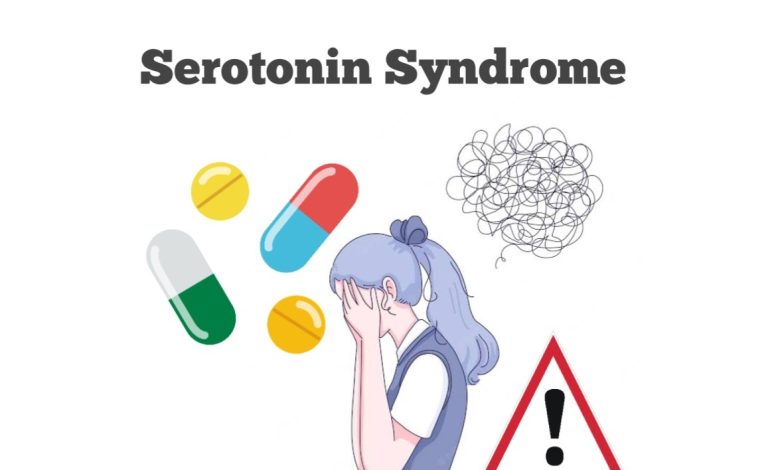What Does Serotonin Syndrome Feel Like?

Serotonin syndrome is a potentially life-threatening condition that occurs when there is an excess of serotonin in the body. Serotonin is a neurotransmitter that is involved in many important functions in the body, including regulating mood, appetite, and sleep.
Serotonin syndrome can occur when there is an overstimulation of the serotonin receptors in the brain and body. This can happen when a person takes certain medications or supplements that increase serotonin levels, or when they take multiple medications that affect serotonin levels.
The first reported case of serotonin syndrome was in 1960, by a group of researchers who were studying the effects of monoamine oxidase inhibitors (MAOIs) on the brain. The researchers found that when MAOIs were combined with a medication called meperidine (a painkiller), it caused a series of symptoms including agitation, confusion, hyperthermia, and muscle rigidity. They concluded that this was due to an excess of serotonin in the brain, and coined the term “serotonin syndrome” to describe the condition.
Since then, numerous cases of serotonin syndrome have been reported, most commonly as a result of medication interactions. The incidence of serotonin syndrome has increased with the widespread use of antidepressants, particularly selective serotonin reuptake inhibitors (SSRIs), which are commonly used to treat depression and anxiety. However, the condition can also occur with other medications that affect serotonin levels, such as MAOIs, SNRIs, and certain pain medications.
It is important to note that serotonin syndrome is a rare but serious condition that requires prompt medical attention. If you or someone you know is experiencing symptoms of serotonin syndrome, it is important to seek immediate medical attention.
How Common is Serotonin Syndrome?
Serotonin syndrome is a relatively rare condition, but it can be life-threatening if left untreated. The exact incidence of serotonin syndrome is difficult to determine, as there is no standardized reporting system and many cases may go undiagnosed or misdiagnosed.
However, it is estimated that the incidence of serotonin syndrome ranges from 0.1 to 0.5% of patients who are treated with serotonergic medications. The incidence may be higher in certain populations, such as patients with psychiatric disorders who are taking multiple medications that affect serotonin levels.
The risk of serotonin syndrome is highest when multiple medications that affect serotonin levels are used together, or when high doses of a single medication are used.
What Medications Cause Serotonin Syndrome?
Serotonin syndrome can be caused by a variety of medications, supplements, and herbal products that affect serotonin levels in the body. Some of the medications that are most commonly associated with serotonin syndrome include:
1. Selective serotonin reuptake inhibitors (SSRIs): SSRIs are a class of medications commonly used to treat depression and anxiety. Examples include fluoxetine (Prozac), sertraline (Zoloft), and citalopram (Celexa).
2. Serotonin-norepinephrine reuptake inhibitors (SNRIs): SNRIs are another class of medications used to treat depression and anxiety. Examples include venlafaxine (Effexor) and duloxetine (Cymbalta).
3. Monoamine oxidase inhibitors (MAOIs): MAOIs are a class of medications used to treat depression and other psychiatric disorders. Examples include phenelzine (Nardil) and tranylcypromine (Parnate).
4. Triptans: Triptans are a class of medications used to treat migraines. Examples include sumatriptan (Imitrex) and rizatriptan (Maxalt).
5. Opioid pain medications: Certain opioid pain medications, such as fentanyl and tramadol, can increase serotonin levels in the body and cause serotonin syndrome.
6. Lithium: Lithium is a medication used to treat bipolar disorder. It can increase serotonin levels in the brain and lead to serotonin syndrome.
7. St. John’s wort: St. John’s wort is an herbal supplement commonly used to treat depression. It can increase serotonin levels and interact with other medications to cause serotonin syndrome.
It is important to note that this is not an exhaustive list, and other medications and supplements can also cause serotonin syndrome. If you are taking medications or supplements and are concerned about the risk of serotonin syndrome, talk to your healthcare provider.
What Does Serotonin Syndrome Feel Like?
Serotonin syndrome can cause a variety of symptoms that can affect different parts of the body. Here is a detailed description of some of the most common symptoms:
1. Agitation and restlessness: Serotonin syndrome can cause a sense of restlessness, nervousness, and agitation. You may feel like you cannot sit still or that you need to move constantly.
2. Confusion and disorientation: Serotonin syndrome can cause confusion and disorientation, making it difficult to concentrate or perform simple tasks. You may feel like you are in a fog or have trouble remembering things.
3. Rapid heartbeat and high blood pressure: Serotonin syndrome can cause your heart to beat faster than normal and your blood pressure to rise. You may feel your heart racing or pounding in your chest.
4. Dilated pupils: Serotonin syndrome can cause your pupils to become larger than normal, which can affect your vision and make it difficult to see in bright light.
5. Muscle rigidity and muscle twitching: Serotonin syndrome can cause muscle rigidity, making it difficult to move or perform normal activities. You may also experience muscle twitching or jerking.
6. Tremors and shivering: Serotonin syndrome can cause tremors, which are involuntary shaking or trembling movements. You may also feel shivery or cold.
7. Sweating and fever: Serotonin syndrome can cause excessive sweating and a high body temperature, leading to fever and chills.
8. Nausea, vomiting, and diarrhea: Serotonin syndrome can cause gastrointestinal symptoms such as nausea, vomiting, and diarrhea.
9. Headache: Serotonin syndrome can cause a severe headache that may be accompanied by sensitivity to light and sound.
10. Seizures: In severe cases, serotonin syndrome can cause seizures, which are sudden, uncontrolled electrical disturbances in the brain that can cause convulsions and loss of consciousness.
It is important to note that not everyone will experience all of these symptoms, and the severity of symptoms can vary depending on the individual and the degree of serotonin excess. If you are taking medications that affect serotonin levels and experience any of these symptoms, seek immediate medical attention.
How To Reduce Your Risk Of Serotonin Syndrome
To reduce your risk of serotonin syndrome, it is important to follow these steps:
- Talk to your healthcare provider: It is important to inform your healthcare provider of all medications, supplements, and herbal products you are taking, including over-the-counter medications. Your healthcare provider can help you determine if there is a risk of serotonin syndrome and monitor you for signs and symptoms.
- Stick to prescribed doses: Take medications only as prescribed and do not exceed the recommended dose. This includes prescription medications, over-the-counter medications, and supplements.
- Avoid combining medications: Do not take multiple medications that affect serotonin levels without consulting your healthcare provider. This includes prescription medications, over-the-counter medications, and supplements.
- Pay attention to how you feel: Be aware of any changes in your mood, behavior, or physical symptoms after starting a new medication. If you experience any symptoms of serotonin syndrome, seek medical attention immediately.
- Monitor for interactions: Certain medications, supplements, and herbal products can interact with other medications and increase the risk of serotonin syndrome. Be aware of potential interactions and ask your healthcare provider for guidance.
- Know when to seek medical attention: If you are taking medications that affect serotonin levels and experience symptoms of serotonin syndrome, seek medical attention immediately. Early recognition and treatment can be critical in preventing serious complications.
It is important to note that serotonin syndrome can be a serious and potentially life-threatening condition. If you are concerned about the risk of serotonin syndrome or have questions about your medications, talk to your healthcare provider.





